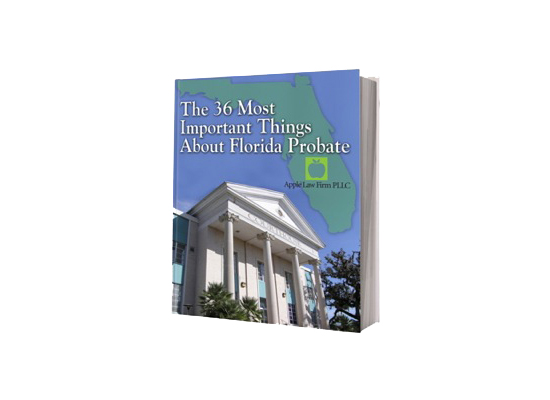LANDING SAFER
Probate Lawyer in Jacksonville
Jacksonville Probate Lawyer

Jacksonville Florida Probate Attorneys, Lawyers & Counselors deal with the distribution of assets of a Florida Probate estate. The Probate and court fees for these services are typically set by statute, but often with larger Jacksonville Probate cases they are negotiable. Read this article for more information on How long a Florida Probate case takes. The probate counselor fees are generally based on the assets that are subject to probate and not all of the decedent’s assets. Typically the home and other assets are not counted when fees are calculated. To find out how much a Florida Probate should cost, please call us and request a Probate Intake Form so that one of our Attorneys and Counselors can give you a cost.
There are three main types of Florida Probate Law. Our Jacksonville Florida Probate Attorneys and Law Firm handles Probate cases dealing with a Florida Summary Administration, Probate, Full Administration of Probate cases, and Ancillary Administration Probate cases. To determine which type of Florida Probate case you need, our Florida Probate lawyers have to examine the amount of assets that are subject to the administration and/or the time that has passed since the death of the decedent.
In a Florida Summary Administration, Probate, the individual must have either died more than 2 years ago or the assets that are subject to the administration of the probate must be less than $75,000. Once of the biggest assets is usually the homestead and this is not counted when figuring the amount of probate assets. In the following sections you will find out more about:
- Formal Administration Probates in Florida
- Summary Administration Probates in Florida
- Ancillary Administrations Probates in Florida and
- Other aspects of Florida Probate Administration.
There are separate areas on this website for issues involving Florida Trust Litigation and Florida Probate Litigation.
To determine how much your probate should cost and begin to gather and organize the information necessary for the Florida Probate, please take a few moments and request our Probate Intake Form.
Probate litigation often involves a will contest. In Florida, probate litigation is one of the most contested areas of the law. Probate litigation is used by surviving family members to correct unnatural or undesired results.
Usually, Florida probate litigation is first considered by an individual when they receive a Notice of Administration. This is a formal document that alerts all interested parties of the death of the decedent, the filing of a Will for probate, and that an objection to the probate proceedings must be commenced within a certain period of time or be forever barred.
After receiving a Notice of Administration an individual only has a limited time to respond and the dispute that may be based on a variety of legal concepts like Lack of Mental Capacity, Undue Influence, Duress, Intentional Interference with an Expectancy, or Improper Signing of the Will).
Once an individual is served with a Notice of Administration, 20 days pass, most promise to settle a dispute is usually unenforceable.
In addition to a will contest there are several other grounds for Probate litigation in Florida. These include will construction or a determination of how the will should be interpreted, a determination of who the heirs are, elective share litigation, actions for breach or removal of a fiduciary or a surcharge action to recover funds lost because of a breach of a fiduciary duty.
Be sure and request your free copy of the Florida Probate Handbook where we cover the following probate topics:
Estate Planning, Elder Law and Probate
Estate planning, elder law and planning for probate are important financial decisions that should be evaluated on a regular basis. Many individuals in an attempt to avoid probate make mistakes that can cost thousands or even hundreds of thousands of dollars in additional taxes or claims by creditors. As we age, it is important to not only review our plans by an estate planning lawyer, but to also review them in terms of elder law issues such as Medicaid. If you would like your Florida Estate plan reviewed, or to find out what options you have to avoid probate, reduce or minimize your estate taxes, or protect your assets from creditors, including Medicaid, you should contact us or another Florida Estate Planning lawyer who also does asset protection and elder law to discuss your specific circumstances and what your options are. If you have done things like transferring property to family members or creating joint owners of property in an attempt to avoid probate, it may not be to late to fix the potential problems you may have created. I hope you enjoy the remaining topics on the Florida Probate process and while this handbook will not enable you to file your own probate case, it may help you understand what is going on in a case you may be involved with or what some of the issues your family and friends may encounter if your estate ends up in a Florida Probate Court.
- When is a probate required in Florida?
- When is a probate not required in Florida?
- What is a will?
- What if there is not a will?
- If a person dies intestate, the decedent’s probate assets will be distributed to the decedent’s heirs in the following order of priority:
- Do I need the original Will?
- What happens if I cannot find the original Will?
- Is a Will valid?
- Admitting A Will in a Florida probate.
- Contesting A Will in Probate.
- Is a contract to create or not change a Will valid?
- What if the will is filed with a court in another county or state?
- What if we find a will after the probate is finished?
- Who is involved in the probate process?
- Steps in opening a probate.
- Gathering information.
- Will probate be required in another state?
- What is a Florida Homestead?
- Who gets what from the Florida Homestead?
- Does the homestead have equity?
- Who is responsible for the remaining loan on the property?
- Where should the probate be filed?
- What type of probate should be filed?
- Disposition without Administration
- Summary Administration
- Formal Administration
- Ancillary Administration
- How are attorneys’ fees calculated?
- In addition to the fees for ordinary services, the attorney for the personal representative shall be allowed reasonable compensation for extraordinary services. Extraordinary services may include:
- Should the estate be charged a probate fee on a homestead?
- Who supervises a probate administration?
- What happens if an improper distribution is made?
- What are some of the additional things that may be required in a Florida Probate?
- Elective share and family support
- Letters of Administration
- Who can be a personal representative in Florida?
- What are the duties and responsibilities of the PR?
- The personal representative is obligated to:
- Opening a safe deposit box before a probate for inspection
- Safe deposit box entry with a court order
- Is the personal representative entitled to a fee?
- In addition, a Florida personal representative shall be allowed further compensation, as is reasonable, for any extraordinary services including, but not limited to:
- In determining reasonable compensation, the court shall consider all of the following factors, giving weight to each as it determines to be appropriate:
- Must the personal representative post a bond?
- How to Obtain a copy of the Will when someone refuses
- What if there is a revocable trust?
- Does the revocable trust become irrevocable?
- Do I have to File an Inventory?
- What if I do not agree with the Inventory or an accounting?
- Tax issues
- Filing Estate Tax Returns
- Objecting to claims
- Can I settle a claim with a creditor in a Florida Probate?
- Order of payment of expenses and obligations in a Florida probate
- Probate litigation
If you need help with the Probate of a family member who resided in Florida or owned real property in Florida at the time of their death CONTACT our Jacksonville Florida Probate Lawyers by email or call us at 904-685-1200 to discuss your situation today.












